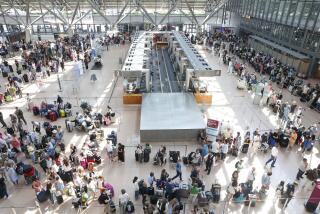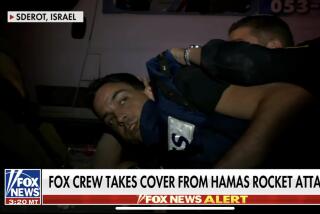The Revolution Will Not Be Televised : Anchors Came for Summit, Walked Into History
- Share via
NEW YORK — Cable News Network anchor Bernard Shaw, still in Beijing, spent Sunday fully expecting the authorities to cut all phone lines out of China, severing the last link of live reports by foreign broadcasters there.
And then, he said in a late-night phone interview as Army troops massed to clear Tian An Ming Square of hundreds of thousands of protesters, “We just sit here until the government feels it has control of the situation and can loosen the screws.”
CBS’ Dan Rather, meanwhile, arrived home in New York, instructed by his bosses to leave Beijing Saturday when, he said, it appeared the airport might be shut down. He stopped in Tokyo to drop off news footage taped before and after authorities ordered CBS and CNN to shut down their portable transmitters and pulled the plug for NBC and ABC at the state-run China Central Television satellite uplink station.
The live shots of the CBS and CNN shutdowns Friday night--CNN was first to go at 7:05 p.m. PDT (11:05 a.m. Saturday in Beijing), followed by CBS at 8:49 p.m. PDT--dramatically symbolized the news dimout for American and other foreign networks.
But their reports continued by phone, with their networks showing photos of the reporters, maps of Beijing, pre-shutdown tapes or fresh footage taped despite severe restrictions by Chinese authorities and “pigeoned” out of Beijing by departing staffers or travelers.
It all occurred in an extraordinary week for the networks--one that began with Soviet leader Mikhail Gorbachev’s historic China visit, and evolved into high-tension confrontations that had exhausted reporters and producers working almost nonstop.
It was a particularly extraordinary week for both Shaw and Rather. The latter, in addition to signing off Friday as CBS’ plug was pulled, also anchored a “48 Hours” special Thursday from Beijing.
“Unbelievable--we all came here to cover a summit and we walked into a revolution,” Shaw told viewers shortly before CNN’s satellite link was cut, preceded by dramatic split-screen shots of Jane Maxwell, CNN special events vice president in Atlanta, talking with officials in Beijing, trying to keep the video line open.
“I personally expect next a cutting of all telephone communications out of here and a shutting down of the airport,” Shaw said Sunday. “I just regard it as standard operating procedure.”
On CBS’ Sunday newscast, CBS Beijing bureau chief John Sheahan, was reporting live by phone of the possibility of a “massacre” in the streets when army troops moved to clear Tian An Men Square.
Earlier Sunday, Shaw said, the government had briefly jammed reception of network newscasts dealing with the China story. That stopped, he said, “but I expect it to continue.”
Shaw and Rather were the only American network news anchors on the scene all week, NBC and ABC having decided to keep Tom Brokaw and Peter Jennings here.
“It’s a hell of a story,” said Rather, adding that he wanted to stay but that CBS officials, who only had 20 minutes to decide whether he should catch what might prove the last flight from Beijing for a while, told him to leave.
Rival ABC and NBC had correspondents reporting from Beijing, but the sounds of teeth gnashing in envy could be heard in New York.
“We’re getting our butts kicked,” one stateside NBC producer moaned to a friend earlier in the week.
For NBC, the timing of its keep-Brokaw-here decision was awkward. Friday’s plug-pulling in Beijing came as NBC’s affiliates were gathering in San Francisco for their annual convention.
But NBC News President Michael Gartner didn’t think the decision was a mistake.”No, of course not,” he said Saturday from San Francisco. Referring to NBC’s staff in Beijing, including Asian veterans George Lewis and Kenley Jones, he said he was “happy with the work that everybody who’s been over there. . . .”
ABC sent a 30-man crew that among other things shot footage of CNN’s plug-pulling, 20 seconds of which it provided CNN late Friday. But worried about a potentially explosive situation in Panama, the network kept Jennings here.
Like others in CNN’s 60-member delegation, Shaw, who celebrates his 49th birthday today, had averaged only about two or three hours of sleep a day, feeding the 24-hour-a-day network with constant updates watched closely by both American viewers and rival networks.
CBS’ Sheahan, part of CBS’ 60-member Beijing contingent, wasn’t surprised that authorities ordered CBS’ satellite uplink shut down hours before CBS’ permission to use it expired.
Incredibly, about 600 viewers in New York were outraged and called in complaints Friday night--not about the government’s action, but CBS’ two live reports--one for three minutes, then other for 18 minutes--that interrupted the season-ending episode of “Dallas.” Later, the broadcast of “Beauty and the Beast” in Los Angeles was interrupted for another 3-minute live report from Beijing that ended at 8:49 PDT, when a network technician flicked a switch and the screen faded to video snow.
Despite the protests, Rather said he’d heard that one viewer called to say, “I was watching Dan Rather and he was interrupted by ‘Dallas,’ and what’s going on here?’ ”
Shaw, who with colleagues Mike Chinoy, Steve Hurst and producer Alec Miran worked in relays, wasn’t surprised that phone links weren’t shut down at the same time the government pulled the plug on video transmissions.
“I think they want to get everything lined up” before they start quelling demonstrations, he said. “They want it to be precise . . . they want whatever they do to be effective.”
With phone links still open Friday night, it was possible for CNN’s Beijing staff to Fax the government’s official, written, earth-station shut-down order to CNN executive Jane Maxwell in Atlanta.
She said the authorities threatened to confiscate CNN’s satellite uplink if the order wasn’t obeyed.
“That was a real concern,” she said Saturday, shortly after an ABC News crew, as part of its coverage of the story, taped an interview with her.
Reporters in Beijing had another major concern when martial law was imposed Friday. It was Municipal Order No. 3, in which foreign reporters’ movements were sharply restricted, and taping and interviews with Chinese forbidden.
The movement restrictions, CBS bureau chief Sheahan said by phone Saturday, included barring reporters from Tian An Men Square, a 40-minute drive from the CBS encampment at a hotel with a now-ironic name--the Shangri-La Hotel.
Still, he said, he’d met with no hostility from the students, their professors and ordinary residents of Beijing, even though on Saturday “they kept coming up to us and saying, ‘Well, haven’t you heard? You foreigners aren’t allowed to be here, to take pictures.’
“We’d ask, ‘Do you want us to leave?’ And they’d say, ‘No, no, you must tell the world what’s going on here.’ ”
More to Read
The biggest entertainment stories
Get our big stories about Hollywood, film, television, music, arts, culture and more right in your inbox as soon as they publish.
You may occasionally receive promotional content from the Los Angeles Times.










